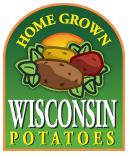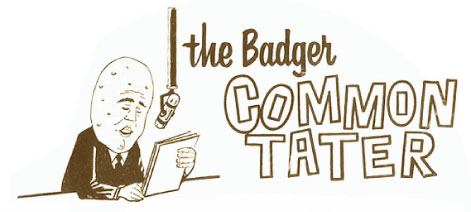Badger Common’Tater December 2014 Issue
Interview with Heidi Alsum-Randall
Alsum Farms & Produce, Inc. was started by Glen Alsum in 1973 as a potato repacking operation in a 600 sq. ft. shed. Glen bought 50- and 100-pound bags of Wisconsin potatoes and onions and repacked them into smaller 5-, 10-, and 15-pound bags and sold them to local grocers. By 1979, he was offering other fruits and vegetables and had also expanded to a 4,000 square foot warehouse.
Larry Alsum became general manager and owner in 1981 after Glen’s passing in a plane crash. Larry, who grew up on a family-owned dairy farm and went to college to become a CPA, began growing Wisconsin potatoes in 1989. By 1992, he was growing 750 acres of potatoes.
Today, Alsum Farms & Produce and its subsidiary companies, have two generations working together farming over 2,100 acres of Healthy Grown potatoes in the lower Wisconsin River Valley. Alsum Farms grows russets, reds, whites, golds, purples, and fingerlings. With over 150,000 square feet of production and warehouse facilities and an average of 175 full-time employees, Alsum Farms & Produce is a national distributor of Wisconsin potatoes and onions. Alsum also distributes a full-line of 300 fruits and vegetables in the Midwest, along with locally grown produce. Alsum Transport and their fleet of over 30 tractors and 60 refrigerated trailers delivers the highest quality produce to retail and foodservice customers locally and throughout the nation.
Larry Alsum’s daughter, Heidi, serves as the National Sales & Marketing Manager for Alsum Farms & Produce. A 2004 graduate of the University of Wisconsin-Whitewater, Heidi has a Bachelor’s Degree in Business Administration-Human Resource Management. She has been a long-time member of the WPVGA Promotions Committee and has served for several years as a Director on the Wisconsin Potato Industry Board (WPIB). She has the distinction of being the first woman to serve as President of the WPIB after being elected to that position in June of 2014.

Taking part in a Spudmobile promotion at Lambeau Field in Green Bay are (L-R) Wendy Dykstra, Jerry Bushman, Larry Alsum, Heidi Alsum-Randall, Kelsey Sorenson and Chris Brooks.
In the following interview, Heidi shares her views on a number of issues related to the Wisconsin potato and vegetable industry.
What were the major challenges for your farm during the 2014 potato and vegetable growing season?
We had a late spring and a cool summer which pushed our harvest back later than normal. Overall we had good weather during our growing season.
What is your assessment of this year’s potato crop?
Alsum Farms & Produce has an excellent crop to sell this year. Alsum Farms had above average yields across most varieties that we grew. We have a larger than average size profile which is what I have been hearing from a lot of other growers throughout Wisconsin.
As the newly-elected President of the Wisconsin Potato Industry Board, what do you see as the most critical issues currently facing the potato industry?

Wisconsin Potato Industry Board (WPIB) President Heidi Alsum-Randall shares a light moment with past-president Tom Wild at the WPIB meeting held November 13 in Plover. On the right is WPIB Vice President Cliff Gagas. Elected in June of 2014, Alsum-Randall is the first woman to serve as President of the WPIB.
The critical issues I see facing the potato industry are: water (quantity and quality), nutrient management, disease management, potato varieties, and the demands of the marketplace. As a board, we acknowledge the importance of these issues and funding projects that will help all Wisconsin potato and vegetable growers.
What do you see as priorities for the potato industry in the area of governmental affairs?
The need is ongoing to develop and maintain relations with both government agencies and our elected representatives. We need to be proactively involved in working together toward solutions that benefit our growers and all Wisconsin residents.
What are the primary topics of potato research that you think merit funding now and into the future?
I think it is important to continue to look at improving the varieties that we market. We need to look at their disease resistance, storability and flavor. We also need to continue to integrate new technology and science-based research to conserve our resources.
As a member of the WPVGA Promotions Committee, what do you see as the key initiatives of that committee that will have the greatest impact on the industry?
Educating consumers about potato nutrition will help to increase consumption. As I talk to consumers at various retail events I am amazed at how many consumers are unaware of the many health and nutrition benefits of potatoes. After they learn about the nutritional benefits–110 calories, 18% Daily Value (DV) of Potassium, 45% DV Calcium, 8% DV Fiber–they become excited about incorporating more potatoes into their diet. Also, exposing consumers to the many different varieties of potatoes and informing them about the benefits of each type is important. Consumers love recipes and want to be inspired with new and unique ways to prepare potatoes.

Dave Katsma, Heidi Alsum-Randall and Sue Thomas work the booth for Alsum Farms & Produce at the Wisconsin Grocers Association Innovation Expo in the Wisconsin Dells.
What are your thoughts on the new Wisconsin Spudmobile, and how can that vehicle be used most effectively?
I am really excited about the Spudmobile and the flexibility it offers as a mobile billboard for Wisconsin potatoes. This has been a dream of the WPVGA Promotions Committee for a couple of years and to see it finished is a milestone. We wanted the Spudmobile to be an educational and interactive experience for consumers teaching them about Wisconsin potatoes. The Spudmobile will travel to a wide variety of events each year, such as schools, festivals, retailer promotions, and major sporting events to educate consumers on potato nutrition, our sustainable farming practices, and connect consumers to Wisconsin potato farmers.
What changes do you see coming and where do you see the potato industry headed in the years to come?
The foundation of the industry will continue to be a healthy and nutritious potato at a good value. However, the industry needs to adopt and adapt to changes in the consumer marketplace. This will be a combination of new packaging, new varieties, and more convenience. Science and technology will speed up the pace of change as we work to conserve our natural resources and improve our efficiencies.


